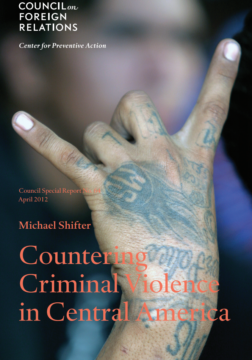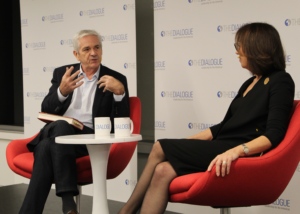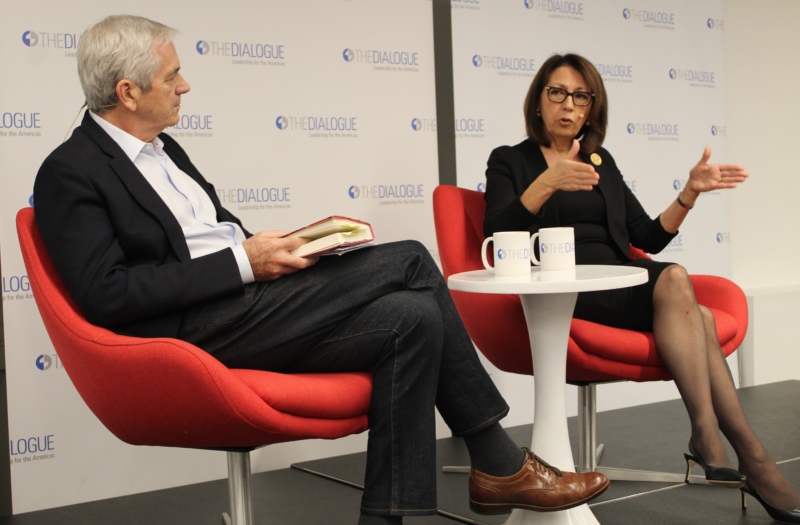
Countering Criminal Violence in Central America
Violent crime in Central America, particularly in the “northern triangle,” is reaching breathtaking levels.
On October 30, the Inter-American Dialogue hosted a book talk with Marie Arana, author of Silver, Sword, and Stone: Three Crucibles in the Latin American Story. In this book, Arana weaves three modern stories with the history of the past millennium to explain three enduring themes that have defined Latin America since pre-Columbian times: the foreign greed for its mineral riches, an ingrained propensity to violence, and the abiding power of religion. The commentator of the event, Tom Gjelten of NPR, emphasized the craft of Arana’s book, stating that she had “pulled of the achievement of writing what I see as the internal history, the story of Latin America's soul over the last 500 years. It combines literature journalism and history all in one.” The two discussed Arana’s motivation for writing the book as well as relevant themes touched upon in Silver, Sword, and Stone such as the difference between northern and southern independence movements and the commonalities of the Latin American experience and its relevance today.
[caption id="attachment_89484" align="alignleft" width="300"] Tom Gjelten and Marie Arana[/caption]
Tom Gjelten and Marie Arana[/caption]
When asked about the stark contrasts between North American post-colonial story and the experiences of Latin America, Arana noted her firm belief that history informs the character of the people and culture of a place. She describes her motivation for writing the book as an effort to utilize her own experience as a child with a Peruvian father and a North American mother. She stated, “[My parents] always seem baffled by each other's cultures, urgently in need of a translation. It trained me to think about the deep cultural divide between the Americas and the very separate histories that inform them.” This childhood experience carries over into her writing. She added, “I had to explain to North Americans who Latin Americans were, and every book I've written has been a form of explanation.”
Arana went on to discuss how she was particularly struck by the initial encounter of the Spanish conquistadors with the indigenous American populations. She described the event as a “forceful and fateful meeting” between two cultures who did not understand one another but both desired to conquer the other for very different reasons. For the Spaniards, the desire to conquer the indigenous peoples and the territory was driven by financial concerns, after the empire had been nearly bankrupted from its drawn-out war to eject the Moors from the Spanish peninsula. On the other hand, the indigenous tribes were driven by what Arana described as a restlessness and an uncertainty after massive growth through the conquering of other indigenous tribes.
Another common theme that was prevalent throughout the discussion was the important differences between independence movements in North and South America. On a practical level, Arana noted how the Wars of Independence varied greatly in the way in which they were fought. She added that “in North America you had the war being fought over the rolling hills of Maryland in Virginia. [Whereas,] in Latin America …the Wars of Independence were fought over terrain that was unforgiving- over the Andes” as well as jungle and rivers, which were very difficult to traverse. She also noted that the Latin American Wars of Independence were much less geographically concentrated, occurring over terrain that “was seven times as large as the area that the North American Revolution was fought in.”
[caption id="attachment_89481" align="alignright" width="300"] Arana signing copies of "Silver, Sword, and Stone: Three Crucibles in the Latin American Story"[/caption]
Arana signing copies of "Silver, Sword, and Stone: Three Crucibles in the Latin American Story"[/caption]
During the Q&A portion of the evening, Arana continued to note the difference between the north and south’s independence movements, particularly in the form of leadership. When asked about the similarities between George Washington and Simon Bolivar, Arana noted that while the two leaders were both military men and came from wealthy families, they were quite different. She remarked that Bolivar’s revolution was comprised of many soldiers that were former slaves, something the US founding fathers, such as Washington and Adams, were very critical of. Ultimately, this was one of the reasons the US did not support the rebellions in Latin America. During the Q&A portion, Arana also discussed how she chose the three narratives to represent the three components of her book- silver, sword, and stone. The evening concluded with a wine and cheese reception and book signing with Arana.
Violent crime in Central America, particularly in the “northern triangle,” is reaching breathtaking levels.
Public security is today the issue that most troubles the citizens of nearly every country of Latin America and the Caribbean.
With roughly 50,000 murders a year for the past decade, Brazil is one of the world’s most violent countries.
 Irene Estefanía González / Inter-American Dialogue
Irene Estefanía González / Inter-American Dialogue

